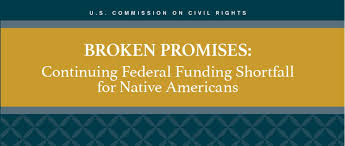
EXECUTIVE SUMMARY (From the
Briefing Before The United States Commission on Civil Rights Held in Washington, DC,
December 2018)
Since our nation’s founding, the United States and Native Americans have committed to and sustained a special trust relationship, which obligates the federal government to promote tribal self-government, support the general wellbeing of Native American tribes and villages, and to protect their lands and resources. In exchange for the surrender and reduction of tribal lands and removal and resettlement of approximately one-fifth of Native American tribes from their original lands, the United States signed 375 treaties, passed laws, and instituted policies that shape and define the special government-to-government relationship between federal and tribal governments. Yet the U.S. government forced many Native Americans to give up their culture and did not provide adequate assistance to support their interconnected infrastructure, self-governance, housing, education, health, and economic development needs.
Due at least in part to the failure of the federal government to adequately address the wellbeing of Native Americans over the last two centuries, Native Americans continue to rank near the bottom of all Americans in terms of health, education, and employment. Many Native Americans face unique challenges and harsh living conditions resulting from the United States having removed their tribes to locations without access to adequate resources and basic infrastructure upon which their tribal governments can foster thriving communities. As reflected in the report text that follows, Native Americans are more likely to live in poverty, be unemployed, experience rape or abuse, and be killed by police than any other ethnic or racial group. Native Americans have 1.6 times the infant mortality rate of non-Hispanic whites, and the life expectancy for Native peoples is 5.5 years less than the national average. Native American students have the lowest high school graduation rates in the nation. The broken treaties have left many reservations without adequate access to clean water, plumbing, electricity, internet, cellular service, roads, public transportation, housing, hospitals, and schools. The often-isolated locations, lack of accurate and full inclusion in the media and in textbooks, and persistent discrimination have rendered their reality often invisible to other Americans.
